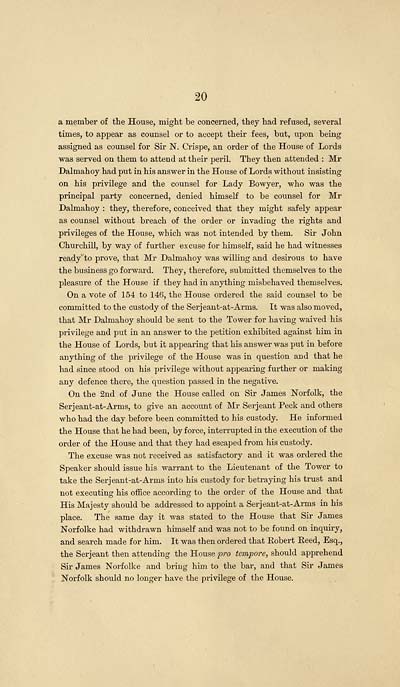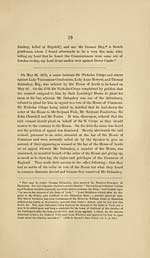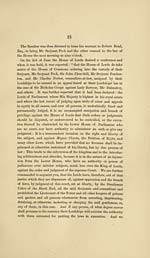Download files
Complete book:
Individual page:
Thumbnail gallery: Grid view | List view

20
a member of the House, might be concerned, they had refused, several
times, to appear as counsel or to accept their fees, but, upon being
assigned as counsel for Sir N. Crispe, an order of the House of Lords
was served on them to attend at their peril. They then attended : Mr
Dalmahoy had put in his answer in the House of Lords without insisting
on his privilege and the counsel for Lady Bowyer, who was the
principal party concerned, denied himself to be counsel for Mr
Dalmahoy : they, therefore, conceived that they might safely appear
as counsel without breach of the order or invading the rights and
privileges of the House, which was not intended by them. Sir John
Churchill, by way of further excuse for himself, said he had witnesses
ready'to prove, that Mr Dalmahoy was willing and desirous to have
the business go forward. They, therefore, submitted themselves to the
pleasure of the House if they had in anything misbehaved themselves.
On a vote of 154 to 146, the House ordered the said counsel to be
committed to the custody of the Serjeant-at-Arms. It was also moved,
that Mr Dalmahoy should be sent to the Tower for having waived his
privilege and put in an answer to the petition exhibited against him in
the House of Lords, but it appearing that his answer was put in before
anything of the privilege of the House was in question and that he
had since stood on his privilege without appearing further or making
any defence there, the question passed in the negative.
On the 2nd of June the House called on Sir James Norfolk, the
Serjeant-at-Arms, to give an account of Mr Serjeant Peck and others
who had the day before been committed to his custody. He informed
the House that he had been, by force, interrupted in the execution of the
order of the House and that they had escaped from his custody.
The excuse was not received as satisfactory and it was ordered the
Speaker should issue his warrant to the Lieutenant of the Tower to
take the Serjeant-at-Arms into his custody for betraying his trust and
not executing his office according to the order of the House and that
His Majesty should be addressed to appoint a Serjeant-at-Arms in his
place. The same day it was stated to the House that Sir James
Norfolke had withdrawn himself and was not to be found on inquiry,
and search made for him. It was then ordered that Kobert Reed, Esq.,
the Serjeant then attending the House pro tempore, should apprehend
Sir James Norfolke and bring him to the bar, and that Sir James
Norfolk should no longer have the privilege of the House.
a member of the House, might be concerned, they had refused, several
times, to appear as counsel or to accept their fees, but, upon being
assigned as counsel for Sir N. Crispe, an order of the House of Lords
was served on them to attend at their peril. They then attended : Mr
Dalmahoy had put in his answer in the House of Lords without insisting
on his privilege and the counsel for Lady Bowyer, who was the
principal party concerned, denied himself to be counsel for Mr
Dalmahoy : they, therefore, conceived that they might safely appear
as counsel without breach of the order or invading the rights and
privileges of the House, which was not intended by them. Sir John
Churchill, by way of further excuse for himself, said he had witnesses
ready'to prove, that Mr Dalmahoy was willing and desirous to have
the business go forward. They, therefore, submitted themselves to the
pleasure of the House if they had in anything misbehaved themselves.
On a vote of 154 to 146, the House ordered the said counsel to be
committed to the custody of the Serjeant-at-Arms. It was also moved,
that Mr Dalmahoy should be sent to the Tower for having waived his
privilege and put in an answer to the petition exhibited against him in
the House of Lords, but it appearing that his answer was put in before
anything of the privilege of the House was in question and that he
had since stood on his privilege without appearing further or making
any defence there, the question passed in the negative.
On the 2nd of June the House called on Sir James Norfolk, the
Serjeant-at-Arms, to give an account of Mr Serjeant Peck and others
who had the day before been committed to his custody. He informed
the House that he had been, by force, interrupted in the execution of the
order of the House and that they had escaped from his custody.
The excuse was not received as satisfactory and it was ordered the
Speaker should issue his warrant to the Lieutenant of the Tower to
take the Serjeant-at-Arms into his custody for betraying his trust and
not executing his office according to the order of the House and that
His Majesty should be addressed to appoint a Serjeant-at-Arms in his
place. The same day it was stated to the House that Sir James
Norfolke had withdrawn himself and was not to be found on inquiry,
and search made for him. It was then ordered that Kobert Reed, Esq.,
the Serjeant then attending the House pro tempore, should apprehend
Sir James Norfolke and bring him to the bar, and that Sir James
Norfolk should no longer have the privilege of the House.
Set display mode to:
![]() Universal Viewer |
Universal Viewer | ![]() Mirador |
Large image | Transcription
Mirador |
Large image | Transcription
Images and transcriptions on this page, including medium image downloads, may be used under the Creative Commons Attribution 4.0 International Licence unless otherwise stated. ![]()
| Histories of Scottish families > Family of Dalmahoy of Dalmahoy, Ratho, County of Edinburgh > (26) Page 20 |
|---|
| Permanent URL | https://digital.nls.uk/94914682 |
|---|
| Description | A selection of almost 400 printed items relating to the history of Scottish families, mostly dating from the 19th and early 20th centuries. Includes memoirs, genealogies and clan histories, with a few produced by emigrant families. The earliest family history goes back to AD 916. |
|---|

